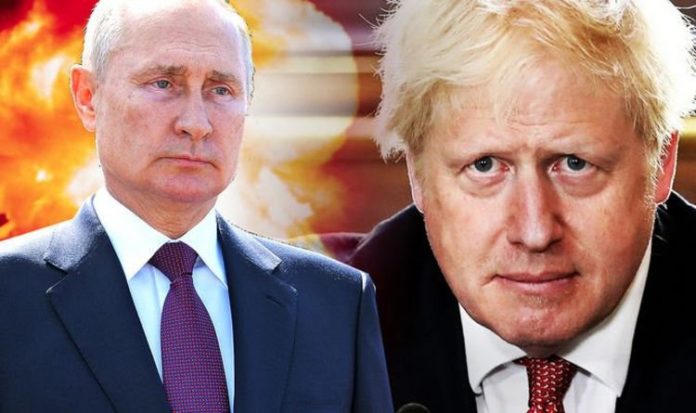As the international community marks the anniversary of the tragedy, nuclear weapons experts have called on world leaders to reflect on their collective responsibility for peace and work towards multilateral nuclear disarmament. On August 6 1945, a US plane dropped the uranium bomb above the city of Hiroshima three days before a second nuclear weapon was dropped on Nagasaki.
To date, the United States remains the only country to have used a nuclear weapon in warfare after the Japanese strikes which killed more than 200,000 in the two cities.
Professor Nick Grief said an all-out nuclear war cannot be ruled out due to the reluctance of world powers to scale back armaments.
The international lawyer and lecturer at the University of Kent, said a significant step which leaders should take towards making the world a safe place is to ratify the Treaty on the Prohibition of Nuclear Weapons, which Ireland did this week.
Prof Grief told Express.co.uk: “I don’t think I could say it’s impossible. I’m amazed that we haven’t had even an accidental nuclear war or explosion in the 75 years since Hiroshima.

Nuclear war remains a major threat 75 years on from Hiroshima, experts have warned (Image: GETTY/PA)

General view of HMS Vigilant, which carries the UK’s Trident nuclear deterrent (Image: GETTY)
“We’ve come mightily close to a nuclear exchange between the superpowers.”
The legal expert on nuclear weapons also called for Britain’s Trident nuclear deterrent to be removed immediately as part of a multilateral approach to disarmament.
He said: “I don’t think we need a nuclear deterrent nowadays in any event.
“When the Government says we would only ever use it in an extreme situation in self-defence or to defend our NATO allies, my answer to that is the international court didn’t actually say that it’s lawful to use it in those extreme circumstances so that concerns me as well.”
READ MORE: China accused of making a ‘mockery of peace’ as it teams up with Iran

Submariners undergo training at HMNB Clyde, which is the home of the UK’s Trident nuclear deterrent (Image: GETTY)
He said he does not believe that the British and other nuclear-armed states “are taking their disarmament obligations seriously enough”.
The 1968 Treaty on the Non-Proliferation of Nuclear Weapons, signed by the UK, says parties should negotiate in good faith on nuclear disarmament.
Prof Grief said the UK’s actions are a direct contrast to what it should be doing to disarm.
He said: “But what are we doing? We’re actually looking to build new nuclear warheads and new submarines to carry them.
DON’T MISS
Hiroshima: Richard Feynman in terrifying nuke test confession [REVEALED]
WW3: How US accidental dropped nuke 1000 times atomic bomb [EXPLAINED]
World War 2 confession: Outrageous way A-bomb genius solved equations [INSIGHT]

A Royal Marine patrols the waters at HMNB Clyde, which is the home of the UK’s Trident nuclear deterrent (Image: GETTY)

Japanese people mark the anniversary of Hiroshima (Image: GETTY)
“So that seems to me, and others, to be at odds with the good faith negotiation obligation.
“So yeah, I think multilateral disarmament is the way to go but I don’t see any signs of it at the moment.”
He warned: “I think we are at the beginning, at least, of a new nuclear arms race and that’s very concerning.
“I look at youngsters today and I wonder what sort of a world they’re going to be living in in 20/30/50 years’ time.

A man and woman view images of Hiroshima in an exhibition (Image: GETTY)
“I’d like our world leaders to project forwards and think, what can we do today to make this world of ours a better place for the generations to come.”
Dr Dan Plesch, an expert in weapons of mass destruction at SOAS University of London, said there is an obvious lack of public attention and no political will among world leaders to pull back in the arms race.
Dr Plesch is the director of SCRAP, the Strategic Concept for the Removal of Arms and Proliferation.
He told Express.co.uk: “I think we need a new response to controlling armaments. We can’t just have an action reaction arms race.
“Global nuclear war is a continuing major existential threat. This is about how many times you bounce the rubble.”
But he warned against the narrative that Western powers routinely push that it is only their opponents who are engaging in an arms race, saying: “Every side is at it.”

A woman prays in Hiroshima (Image: GETTY)
He said many of Russia’s adversaries push the notion that Moscow is amassing powerful weapons while playing down the size of their own.
He explained: “Both the Russians and Western militaries have an investment in overestimating Russian strength – the Russians to look big, and the West to justify Western military expenditures and growth.
“So one needs to look behind that, and behind that one sees a highly unstable situation of arms racing and competition, America introducing faster and more sophisticated weapons, the United States and its allies around Russia exercising their bombers up to the limits of Russian territory in a way in which the Russians are never allowed to do to the United States.”







